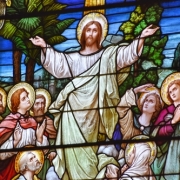“The Two Parts of Redemption” – Exodus 12:27 – August 5 2020
/0 Comments/in Enduring Words for Troubled Times/by David Guzik“Training to Trust” – Exodus 5:22-23 – August 4 2020
/0 Comments/in Enduring Words for Troubled Times/by David Guzik“Using What Is At Hand” – Exodus 4:2 – August 3 2020
/0 Comments/in Enduring Words for Troubled Times/by David GuzikBetter Not To Know
/0 Comments/in Weekly Devotional/by David GuzikAnd He said to them, “It is not for you to know times or seasons which the Father has put in His own authority.” (Acts 1:7)
Just before He ascended to heaven, Jesus spoke with His disciples on the Mount of Olives. They asked (Acts 1:6) if it was now the time for Jesus to restore the kingdom to Israel – that is, if it was time to fully establish the Messianic kingdom.

Jesus answered the question by telling them It is not for you to know. Jesus warned the disciples against focusing on the details of the timing of God’s kingdom, because those things belong to God the Father alone (which the Father has put in His own authority).
At the same time, Jesus did not say that there was to be no restoration of the kingdom to Israel; He simply said that focusing into the time and date of this restoration was not proper for the disciples. It was as if Jesus said to them, “Don’t think about that right now – I’ve got something more important for you to focus on.”
At the same time, I have to wonder: why didn’t Jesus tell them more about how and when, in general, the Messianic kingdom would be fully established?
The Bible teaches (and we believe) that Jesus is God. Therefore, He knew that history would continue for at least 2,000 years after that time. Why didn’t Jesus tell the disciples?
The disciples hoped that it would be soon that the kingdom was fully restored to Israel, but Jesus knew that it was better that did not then know that a lot of history would pass before it would happen. For several reasons, I think it was wise for Jesus not to give a general outline His plan over the next 2,000 years.
– If Jesus had told them, it is likely that they would have been overly discouraged.
– They may have felt that their present work would be useless.
– It would be easy for them to think less of the aspects of God’s kingdom that were present with them at the moment. Just because the kingdom would not fully be restored to Israel at the present moment, that did not mean that the kingdom of God was absent from the earth.
We could probably think of more reasons, but there is something important for us to learn: when Jesus doesn’t tell us something, He has a good reason for it. It can be hard to accept, but it’s a necessary part of discipleship.
Not every question will be answered and not every mystery solved. It doesn’t mean Jesus loves you any less or is any less good to you. It simply means that Jesus knows that it is better for us not to know some things, or it is better for us to know them later.
When you feel Jesus won’t answer your question, take comfort in knowing that sometimes it’s better not to know!
Esperando una promesa
/0 Comments/in Devocional Semanal/by David GuzikY estando juntos, les mandó que no se fueran de Jerusalén, sino que esperasen la promesa del Padre, la cual, les dijo, oísteis de mí. Porque Juan ciertamente bautizó con agua, mas vosotros seréis bautizados con el Espíritu Santo dentro de no muchos días. (Hechos 1:4-5)
Justo antes de ascender al cielo, Jesús les dio a sus discípulos instrucciones importantes. Primero, les mandó que no se fueran de Jerusalén. En este momento, los discípulos no tenían nada más que hacer que esperar la venida del Espíritu Santo (aquí llamada la promesa del Padre). Jesús sabía que los discípulos realmente no podían hacer nada efectivo para el Reino de Dios hasta que el Espíritu Santo viniera sobre ellos.

Jesús les comando que esperasen.
– Esperasen significa que valía la pena esperar la promesa del Padre del Espíritu Santo.
– Esperasen significa que tenían una promesa que el Espíritu Santo vendría.
– Esperasen significa que ellos tenían que recibir el Espíritu; no podían crear una experiencia ellos mismos.
– Esperasen significa que serían probados durante la espera, por lo menos un poco.
Es significativo que esta venida, llenado y empoderamiento del Espíritu Santo fue llamada la promesa del Padre. Aunque hay un sentido en el que ahora también era la promesa del Hijo de Dios, hay significado en la frase, la promesa del Padre.
– Muestra que debemos esperarla con anticipación, porque la promesa del Padre que nos ama tanto solo puede ser buena.
– Muestra que es confiable y se puede contar con ella; un Padre amoroso y poderoso nunca prometería algo que no podría cumplir.
– Muestra que esta promesa es para todos sus hijos, ya que proviene de Dios como nuestro Padre.
– Muestra que debe ser recibida por fe, como es el patrón con las promesas de Dios en toda la Biblia.
Jesús explicó más acerca de esta promesa cuando agregó seréis bautizados con el Espíritu Santo. La idea de ser bautizado es ser sumergido o cubierto en algo; así como Juan bautizó a las personas en agua, estos discípulos serían “inmersos” en el Espíritu Santo.
¿Cuándo sucedería? Cuando Jesús dijo esto justo antes de ascender al cielo, agregó: dentro de no muchos días. Ellos sabían que esta promesa del Padre vendría, pero no de inmediato. Sería dentro de no muchos días pero no pasarían muchos días.
Jesús tenía un propósito al no decirles exactamente cuándo la promesa vendría. Un propósito era que los discípulos pudieran aprender a esperar con fe. Aun así, debemos resistirnos a “crear” un movimiento del Espíritu. En cambio, confiamos en la promesa del Padre y tenemos fe con respecto al derramamiento del Espíritu Santo en nuestra vida. El movimiento real del Espíritu Santo lo vale.
Auf eine Verheißung warten
/0 Comments/in Wöchentliche Andacht/by David GuzikUnd als er mit ihnen zusammen war, gebot er ihnen, nicht von Jerusalem zu weichen, sondern die Verheißung des Vaters abzuwarten, die ihr [– so sprach er –] von mir vernommen habt, denn Johannes hat mit Wasser getauft, ihr aber sollt mit Heiligem Geist getauft werden nicht lange nach diesen Tagen. (Apostelgeschichte 1,4-5)
Kurz bevor Jesus in den Himmel aufstieg, gab Er Seinen Jüngern noch wichtige Anweisungen. Erstens sollten sie nicht von Jerusalem weichen. An diesem Punkt sollten sie nichts anderes tun, als auf den Heiligen Geist (hier die Verheißung des Vaters genannt) zu warten. Jesus wusste, dass sie im Moment nichts Effektives für das Reich Gottes tun konnten, bis der Heilige Geist auf sie gekommen war.

Jesus wollte, dass sie warten.
- Warten bedeutet, dass die Verheißung des Vaters auf den Heiligen Geist es wert war, darauf zu warten.
- Warten bedeutet, dass der Heilige Geist kommen würde.
- Warten bedeutet, dass sie den Heiligen Geist bekommen mussten; sie konnten diese Erfahrung nicht selbst herbeiführen.
- Warten bedeutet, dass sie durch das Warten geprüft würden, zumindest eine Zeit lang.
Es ist von Bedeutung, dass das Kommen, Erfüllen und Bevollmächtigen von dem Heiligen Geist die Verheißung des Vaters genannt wird. Auch wenn es eine Verheißung von dem Sohn Gottes war, ist es bedeutsam, dass hier die Rede von der Verheißung des Vaters ist.
- Es zeigt, dass wir in eifriger Erwartung darauf warten sollten, denn eine Verheißung des Vaters, der uns so sehr liebt, kann nur gut sein.
- Es zeigt, dass sie zuverlässig ist und wir darauf zählen können; ein liebender und mächtiger Vater würde uns nie etwas versprechen, dass Er nicht erfüllen kann.
- Es zeigt, dass diese Verheißung allen Seinen Kindern gilt, denn sie kommt von Gott als unserem Vater.
- Es zeigt, dass sie im Glauben angenommen werden muss, so wie alle Verheißungen von Gott in der Bibel.
Jesus erklärte noch mehr zu dieser Verheißung. Er fügte hinzu: ihr aber sollt mit Heiligem Geist getauft werden. Taufe bedeutet, dass man in etwas eingetaucht oder mit etwas zugedeckt wird. So wie Johannes der Täufer die Leute mit Wasser taufte, so sollten sie Jünger in den Heiligen Geist eingetaucht werden.
Wann sollte das passieren? Jesus sagte dies direkt bevor Er in den Himmel aufstieg, und Er fügt hinzu: nicht lange nach diesen Tagen.
Sie wussten, dass diese Verheißung des Vaters kommen würde, aber nicht sofort. Es sollte nach diesen Tagen geschehen, aber nicht lange nach diesen Tagen.
Jesus sagt ihnen absichtlich nicht genau wann. Zum einen sollten die Jünger lernen, im Glauben zu warten. Auch wir sollten der Versuchung widerstehen, ein Wirken des Heiligen Geistes zu kreieren. Stattdessen sollten wir auf die Verheißung des Vaters vertrauen und einen erwartenden Glauben haben in Bezug auf den Heiligen Geist in unseren Leben. Das echte Wirken des Heiligen Geistes ist es wert.




